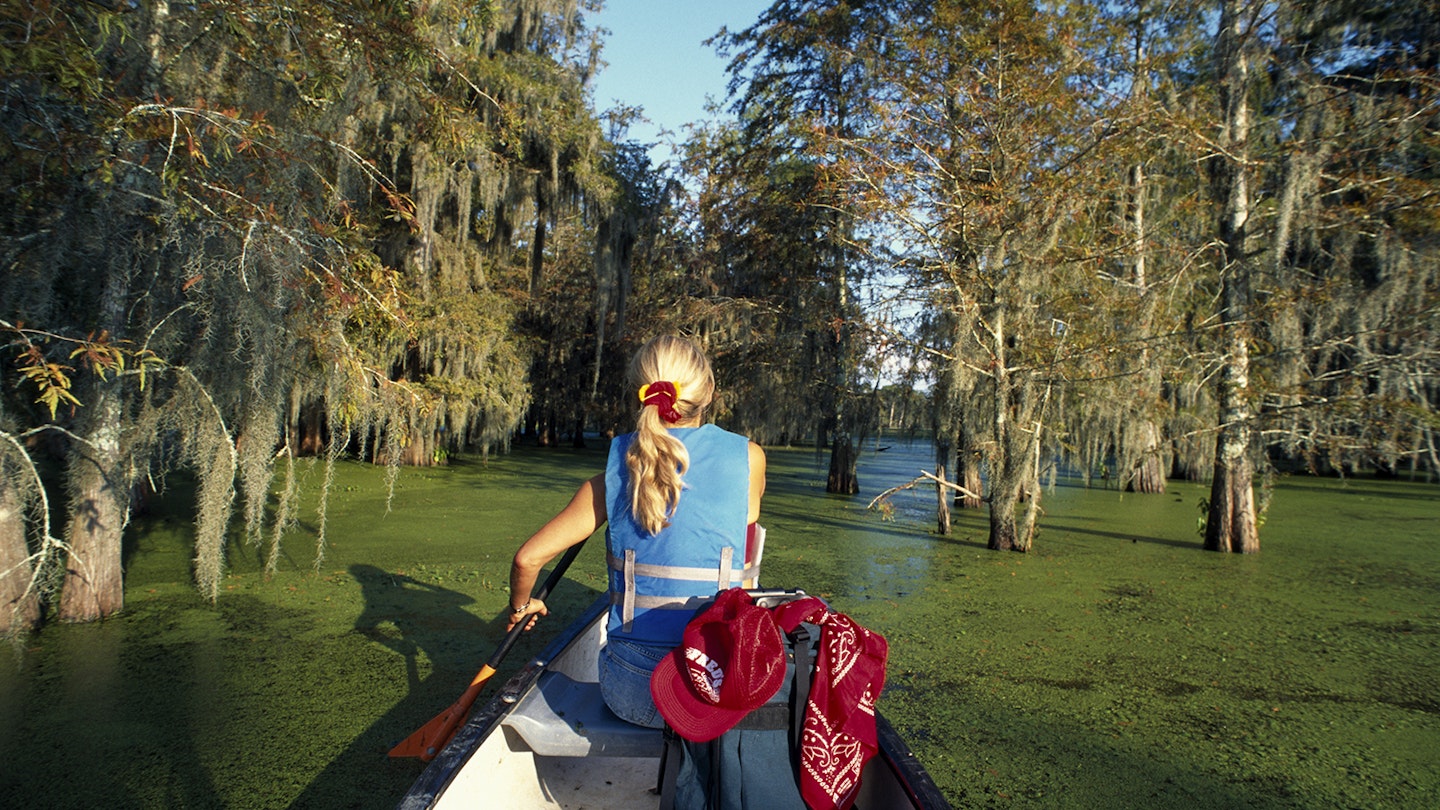Exploring Louisiana’s Wetlands: A Paddler’s Guide
Louisiana has a deep connection to the outdoors in all of its incarnations: land, water, and the median space where those two elements combine. That hybrid space covers much of the state, making for a unique geography and ecology that residents cherish. However, visiting these wetlands can feel daunting to outsiders and sometimes even locals. From bayou paddles to boardwalk strolls, here are ideas for making the most of this watery wilderness.
Pointers for Paddlers
Getting out on the water in Louisiana requires either a powerboat or a paddle, though we recommend the latter. The delicate beauty of the wetlands is easily disrupted by a powerboat’s engine. Kayaking and canoeing can offer a beautiful, meditative journey into an alien wilderness. Within the cypress strands, herons flap across the water while alligator eyes peek out from the mud like logs with devilish grins. In this wet isolation, it feels as if you’ve slipped into the Jurassic era.
However, powerboats can speed by unexpectedly, affecting your peaceful experience. Additionally, you might encounter snakes falling from branches, bugs that seem intent on devouring you, or intense heat reflecting off the water. Paddling in Louisiana Bayou Country often incorporates these experiences, but here are some tips to mitigate the downsides:
- Be cautious of low-hanging tree branches.
- Avoid paddling in July and August when the bugs are most active, and the heat is at its peak.
- Stay clear of small channels to minimize encounters with other boat traffic.
Get on the Water Near New Orleans
There are plenty of opportunities to paddle in Louisiana, and the main trick lies in finding the right launch and renting gear. Moreover, going on a guided tour can eliminate much of the uncertainty of a paddling adventure. New Orleans serves as the main entry point for many visitors, and is crisscrossed by its own waterways, including Bayou St John. If you prefer sticking to the city, you can easily get out on the water with the folks at Kayakitiyat. Although it may not be the flooded forest usually associated with bayous, it offers a pleasant aquatic corridor leading to Lake Pontchartrain.
For something wilder, head to the north shore of Lake Pontchartrain to explore the extraordinary waterscapes of Cane Bayou and Bayou Lacombe with Bayou Adventure. We recommend their tours of Cane Bayou for a more untouched wilderness feel and excellent wildlife spotting opportunities, including enormous garfish that may bump your boat!
For an expert-led kayak trip through the tupelo-cypress forests of Maurepas Swamp Wildlife Management Area, which is located about 40 minutes from New Orleans on the western side of Lake Pontchartrain, consider Lost Land Tours. This tour goes beyond the typical wetland exploration; it provides a carefully researched environmental lesson from guides like Pulitzer Prize-winning reporter Bob Marshall, who has covered Louisiana’s environmental issues for decades.
Drifting a Little Farther Afield
If you’re comfortable launching your kayak alone, excellent paddling trails run through the primordial-looking cypress swamps of Tickfaw State Park, located about 40 miles east of Baton Rouge and 70 miles northwest of New Orleans. For an even wilder experience, travel 125 miles west of New Orleans to the Atchafalaya Basin, the largest swamp in the country.
This vast area is interlaced with countless waterways, including 135 miles of the Bayou Teche National Water Trail. You can find boat launches at Lake Fausse Pointe State Park. Additionally, the Atchafalaya National Heritage Center has friendly staff that can help mark your maps with the best access points for kayaks and canoes in this expansive area.
Boardwalk Strolls, Birds Galore, and Surprising Hikes
If you’re not keen on boating through the bayou, you can always opt to walk above it. Numerous parks in Louisiana feature excellent boardwalk paths that stretch over the wetlands. Less than 20 miles south of New Orleans, the Barataria Preserve showcases flooded forests and waterways teeming with vegetation. Although sightings of alligators have become less common due to invasive plants, they are still occasionally spotted.
Located within New Orleans city limits, the Audubon Nature Center is nestled deep in the overgrown hinterlands on the eastern edge of the city, offering a delightful mix of suburb and countryside. With child-friendly exhibits and a straightforward boardwalk trail, the Nature Center is an ideal outdoor option for families with kids.
In Cajun Country, you can witness flocks of herons and egrets wading above a veritable dinosaur swamp at Lake Martin, situated about 10 miles south of Breaux Bridge. Notably, the boardwalk here is one of the top pedestrian-accessible areas to appreciate a flood forest and waterscape, attracting birdwatchers and day-trippers from Lafayette.
Finally, consider a trip north, approximately 60 miles from Lafayette to Chicot State Park. This area features a cypress-tupelo swamp adorned with Spanish moss, which feels pulled right out of a Southern Gothic novel. The region marks a transition into hardwood forest, and you can enjoy several miles of hiking trails, complementing the eerie beauty of Louisiana’s bayous.




